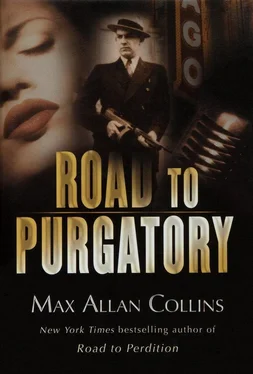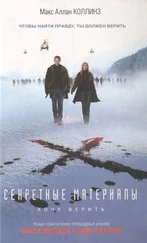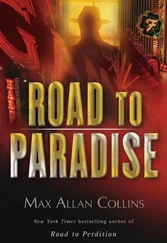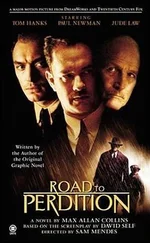Michael got to his feet.
He listened carefully. He could not hear anything but the lapping of the water behind him, the bay beckoning; only now he could afford to head back to the house and use the rental car. Or would others be waiting...?
He was weighing that when another sound drifted across the eerie solitude of the night.
A whimpering.
At first he thought he’d wounded one of them, but the sniveling sound just wasn’t right. It was coming from near the swimming pool. Carefully, he stalked over there, 45 ready; and then he saw the figure, down on the cement beside a deck chair.
A big, fat figure, with curly gray thinning hair, rolled up like the world’s largest fetus. Wearing a purple bathrobe over cream-colored pajamas; with purple slippers.
Michael almost laughed.
In all the excitement, distracted as he was by killing a dozen or so men, Michael had forgotten what this was about.
Capone.
Al Capone, who right now was a whimpering terrified blob on the pool’s cement skirt, and Michael — his mind’s eye filled with the image of his father, dead on the kitchen floor in that farmhouse — grabbed the figure by the arm and flung him onto his back, though the man’s knees pulled up, his eyes wide and confused.
The famous face had a formlessness about it, but this was King Capone, all right — even if those chipmunk cheeks, scars and all, happened to be smeared with tears and snot.
Michael knelt and put the gun in Capone’s pudgy neck, dimpling the flesh, and hovered over him, the ganglord on his back, his about-to-be killer on his knees, as if in prayer.
“Look at me, Snorky! Look at me.”
Capone looked at Michael.
“Do you know who I am?”
Capone’s big eyes registered nothing.
And just as Michael was about to tell the king of crime exactly who he was, Capone asked, in a very small voice, “Where is it?”
Through his teeth, Michael spat: “Where is what?”
“My... my fishing rod?”
Michael winced, trying to make sense of this. He got on his feet, looking down at the fat child-like figure. In the moonlight, around them, lay dead bodies — Michael’s grim handiwork, all to bring him to this moment.
But Al Capone was rummaging around on the cement like a baby seeking its rattle.
“Here it is!”
With great effort, Capone lifted the fishing rod, which had been on the other side of the deck chair, where he managed to awkwardly seat himself; then he cast the line limply into the water.
It was as if Michael weren’t there at all.
The greatest of all gangsters sat fishing in his swimming pool, smiling the smile of a very young and not at all bright child, drool dribbling from plump purple lips as he hummed a tuneless song, oblivious to the carnage around them.
And Michael knew.
He understood. Understood it all: the syphilis had reduced Capone to a near vegetable, and Nitti had hidden that from all but a small select circle, to maintain his own power and the illusion of Capone’s.
There would be no revenge upon Big Al, on this or any night; the syphilis had beaten Michael to it, leaving a brain-damaged, befogged husk where Alphonse Capone had once been. Barely forty, this ancient mariner sat fishing in his pool, waiting for a bite he’d never get.
As he processed this shocking news, Michael did not notice the men slowly approaching — three more guards with guns drawn, and behind them Mimi Capone.
Who said, “Put the gun down, Michael.”
And Michael tossed the gun on the grass, turning his back on what remained of Al Capone. He fell to his knees and began to weep as the men closed in.
The Tri-Cities
March 1922
Annie O’Sullivan had a storybook life, and she knew it.
She was twenty-six years old with a heart-shaped face, reddish blonde hair bobbed Irene Castle — style, with china-blue eyes, doll-like features and the fair, faintly freckled complexion of the Red Irish. Normally petite, at the moment she was a monster — nine months pregnant in a dark blue maternity dress whose feminine white collar made the garment no less tent-like.
The morning had been notably uncomfortable, making her wonder if today would be the day. But by the afternoon, the stirrings had settled down, not even a kick from the anxious resident within her.
She sat reading The Ladies’ Home Journal in the living room of the two-story house on Twenty-second Street in Highland Park, up the hill in Rock Island. Being “up the hill” meant a lot: she and her husband, Mike, had spent almost three years in a shanty in the Greenbush neighborhood below. Now they had one of the nicest homes in town, a two-story white stucco well back from the street on a generous lawn with a detached garage.
Not that the house was ostentatious; there was nothing showy about the O’Sullivans or their home, with its nearly austere interior of pale plaster walls of green and yellow against dark woodwork, softened by curtains of lace.
How exciting it had been to buy all the furniture new (nothing much from where they’d lived before had been worth hanging on to); solid mission oak with straight, unadorned lines — Mike did not care for the fancy new veneers — and her all-white sanitary kitchen, with wood-burning stove, was efficient and modern, a homemaker’s dream.
The house and their simple yet not inexpensive furnishings reflected those within. Her handsome dark-haired husband ( Black Irish, he was) was, for the most part, a serious, dignified man, whose finer qualities emerged in the bedroom, by way of his tenderness, and here in the living room, by way of his love for their son.
Their living room — where she sat in a comfortable, commodious mohair upholstered armchair, suitable to her current size, swollen feet propped up on an ottoman — was as good an indication as any of the devotion Michael O’Sullivan, Sr., felt for Michael O’Sullivan, Jr. The braided carpet on their parquet floor harbored an elaborate electric train layout, the finest Lionel had to offer, from trains and track to signal towers, tunnels, depots, and ticket offices.
With his hat literally in his hand, her husband had begged his wife’s permission to turn their formal living room into a train yard, “for just a little while.” Young Michael was a precocious three, and though she suspected “a little while” might well prove to be months or even years, Annie had no objections to an activity that would keep their little man’s energetic hands, feet, and mind happily occupied.
Not that her son had ever been a problem. Michael, Jr., had an active mind, and loved to play outside with neighborhood boys and girls; he was in general obedient to both his parents — it was as if he’d been born respectful, or perhaps the example of his stoic but not unkind father had sunk in, early on.
About the only battles that ever occurred were at the kitchen table — her boy was a fussy eater. On the other hand, when meals were served in the dining room, the formality of the surroundings encouraged angelic behavior, even in the presence of brussel sprouts.
Right now Michael was having his afternoon nap. He didn’t fuss about it — though the boy did not yet read, he loved books, and would page through picture books ( Peter Rabbit a particular favorite, and L. Frank Baum’s Mother Goose ) until he fell asleep, whether for his nap or at night.
As for the trains, she took no greater pleasure than to sit nearby with a book or a magazine (neither crochet nor needle work interested her), classical music playing on their new console radio, while father and son crouched and scurried and tended around the edges of their railroad yard. The eyes of both her “boys” flashed with a childish glee that she saw often in her son but rarely in her husband.
Читать дальше












